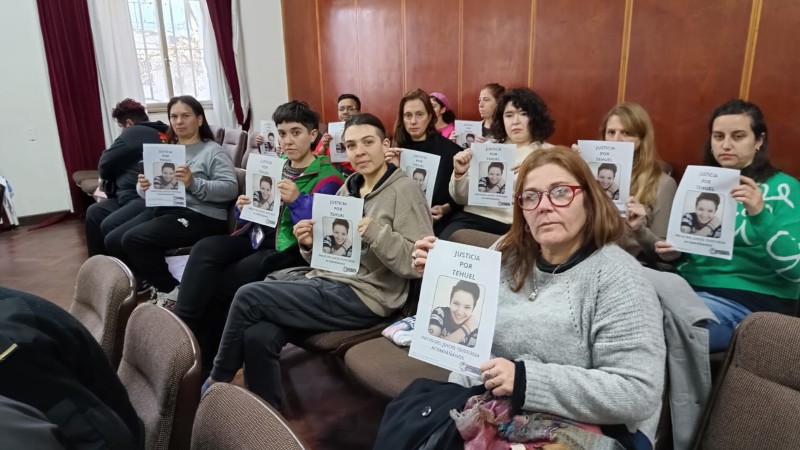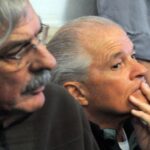
It’s 10:18 in the morning and Ramos enters the courtroom surrounded by police. The court and the prosecution have not yet arrived. Only part of the prosecution, the press, some friends and family in the audience and Norma who waits in silence with her smiling Tehuel vest and a scarf with the colors of pride.
40 minutes pass and the police personnel announce to those present that no flags or vests are allowed inside the room, but the members of the Court enter and clarify: everyone is allowed to wear vests. The chairs are filled and the first witness of the day enters the room, Iara Aranda. In her words, she relives that detail of the pigsty in Ramos’s house: a friend of her mother comes to her house and tells her nervously and scared how when she looks for her partner at Ramos’s house she sees a bucket of blood. The court questions Iara several times, telling her that “they don’t understand what she’s talking about” and asking her questions several times, excusing the witness’s way of speaking.
It’s 11:16, Iara leaves and enters David Alejandro Rodriguez Garciawho says that he knows the accused because he ran into him in the neighborhood and offered him a mattress that had something extra on it: “The mattress had a superficial stain. I notified the police when I found out about all this through the media and they came to my house and took a small piece of the mattress.” David emphasizes several times that in a case like this he wants to help in some way, for Tehuel, whom he has never met.
Shortly after he enters Ricardo Federico Gonzaleswho says he saw Ramos with a boy (whom he later recognizes as Tehuel) during the afternoon of March 11, 2021: the last day he was seen alive. The type of clothing and colors match the clothes Tehuel was wearing that day. After 11:30 Ricardo continues with his story, and the prosecutors discuss among themselves. They approach and talk for a while while Gonzales specifies times.
At 11:46 the fourth witness of the day enters Celeste RamosThe accused is her father’s nephew and both she and the following two witnesses will recount their encounters with Luis Ramos shortly after Tehuel’s disappearance.
“What did you do? Why did you steal from us?”, her mother asks Ramos after visiting them for two days and staying at their house, claiming that she had had an argument with her partner. That argument ends with the decision to kick him out of the house. During those two days he did not want to go out: “I wanted a soda and he sent my partner to buy it.” Later, Susana, Celeste’s mother, will add that Ramos had stolen perfumes, the disability card and even her husband’s psychiatric medication, which they say he consumed.
The DDI went to look for Ramos and, while drugged, he threatened Celeste with a knife so she wouldn’t say he was there. The day before the robbery, he and Susana sat together to read the Bible and prayed. “What did you read?” Judge Claudio Joaquín Bernard asks forcefully – Psalm 18.
Then, Alejandro Eber Sosa He says he found the accused in his house in the bathtub, when he came home from work. “Please don’t report me.” “I didn’t do anything. I didn’t kill her. I’m not going to involve you in anything.” Alejandro lives a block and a half from Ramos and without hesitation, he throws him out.
It’s 1:44 p.m. and it’s time for Mario Diaz who admits having seen Tehuel and Ramos together, and once again the accused is mentioned with a knife fighting and running away from people in the neighborhood. Ten minutes pass and a firm woman’s voice interrupts the story in the distance. “Am I really waiting so many hours for this alone?” There are no answers, but he makes a very graphic statement: The times of justice are far from being the times of the peopleHearings that are delayed an hour, trials that take place three years later, and a question still unanswered that worries thousands, echoes in the air of a room with capacity for just 45 people: Where is Tehuel?
The last witness will arrive, Priscilla Soledad Molerowho worked cleaning Ramos’ mother’s house twice a week and who is presented by the court as the defendant’s “girlfriend.” At the time of Tehuel’s disappearance, she was 20 years old while Ramos was 40 and she was the one who paid him for his work. Priscila speaks softly but her diction is clear. To the successive questions from the Court, the prosecution and the plaintiff, she answers the same: “I don’t remember.” “No.” She looks repeatedly at Ramos and only nods to the questions of the defense attorney Natalia Argenti.
Bernard, faced with her constant refusal, reminds her that she swore to tell the truth and also says sharply: “You have a problem. You can’t answer anything we ask, the questions are easy.” “So what was Ramos afraid of if you didn’t know anything?” Priscila, in her written statement, admits to having been forced by Ramos to have sexual relations and to having received threats so that she wouldn’t talk. Ramos is only a few meters away from her.
It is 2:55 p.m. The prosecution and the complainant are asking for her arrest for false testimony. And while the court is arguing, Ramos’s lawyer is bombarding the young woman with questions about her financial situation, her salary, her family and her relationship with the father of her baby. She answers everything, in her same tone of voice, low and clear. Fragility and vulnerability surround Priscila.
15:16 Priscila Soledad Molero is arrested unanimously, before a slow and classist judiciary.
The second day ends by tattooing the State’s responsibility and the urgent need to obtain a conviction for transhomicide as the complaint states and the prosecutors hope.
Psalm 18, which the accused spoke of, speaks of enemies, hatred and the protection of a god. Who protects the lives of dissidents? And women? And the poor?
Source: www.laizquierdadiario.com

